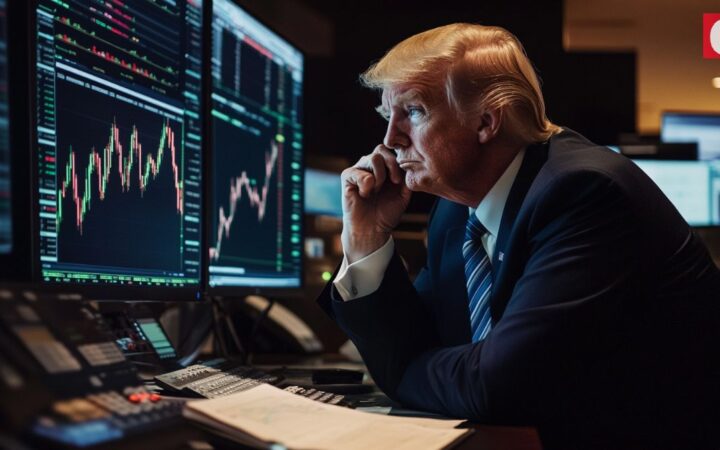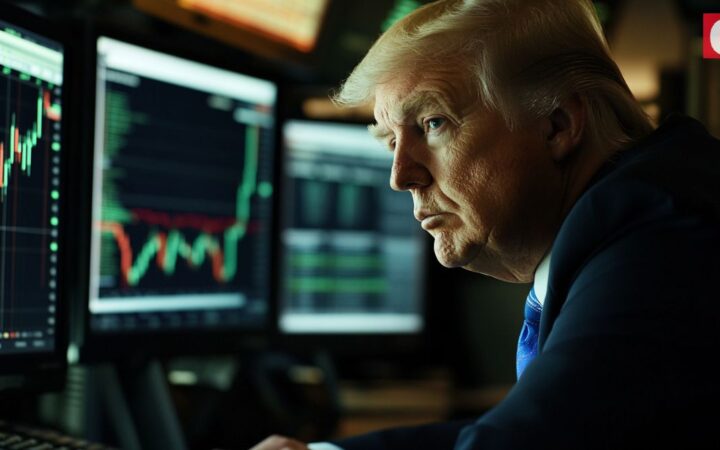
With over 3 years of crypto writing experience, Bena strives to make crypto, blockchain, Web3, and fintech accessible to all. Beyond cryptocurrencies, Bena also enjoys reading books in her spare time.
Inflation and tariffs dominate 2025 market concerns, with 51% of JPMorgan’s institutional clients citing them as key risks, up from 27% in 2024.
 Edited by Julia Sakovich
Updated
3 mins read
Edited by Julia Sakovich
Updated
3 mins read

Balaji Srinivasan, former Coinbase CTO, warns that tariffs could weaken the US economy. Higher prices arrive fast while manufacturing struggles to keep up. Unlike launching new industries, restoring domestic production demands heavy investment and faces steep challenges. The US, relying more on financial services than manufacturing, risks economic instability.
“Tariffs are likely bad for the US economy, but good for cryptocurrency […] Production can’t go up overnight, but prices can. Because returning production to a country is even harder than building it in the first place,” said Balaji Srinivasan.
As protectionism gains traction, Balaji argues that global capitalism may shift to digital platforms. The decentralization movement could accelerate, making crypto-backed systems a strong alternative for international transactions. With governments tightening control over conventional finance, cryptocurrencies could become a reliable financial refuge.
Trust in government-led economies is already fading. Cryptocurrencies use cryptography to stay independent, offering a way out of government-managed markets. Tariffs bring instability, so investors might turn to Bitcoin and other decentralized assets to store value. Smart contracts, unaffected by politics, might change how trade works across borders.
The cryptocurrency market has already felt the tremors of tariff-driven policy shifts. When President Donald Trump imposed tariffs on key trade partners, digital assets reacted. A sudden 8% drop in total crypto market capitalization caused Bitcoin to drop from $102K to $91K in just hours. While volatility spiked, some analysts saw a silver lining — this could drive long-term adoption of decentralized currencies.
Trump’s recent 25% tariffs on imports from Mexico and Canada, along with a 10% tax on Chinese goods, sparked major market fluctuations. A partial policy reversal followed, easing financial turbulence. Announcing a temporary halt, Trump stated an immediate one-month pause on planned tariffs.
Beyond crypto, traditional markets also took a hit. Stocks, currencies, and commodities responded sharply to Trump’s policy maneuvers. Investors scrambled to adjust, reinforcing the notion that economic uncertainty can fuel alternative financial systems.
A recent JPMorgan Chase survey confirmed that inflation and tariffs are now top-of-mind concerns for traders. The annual poll featuring institutional clients found that 51% expect these factors to shape global markets in 2025. This is a notable jump from 27% in 2024, signaling mounting worry over policy-driven instability.

Source: JPMorgan
JPMorgan’s findings highlight a shifting economic landscape. Traditional markets are bracing for turbulence, while crypto stands to gain as a hedge against rising costs. With inflation eating into fiat-based economies, businesses and investors may turn to digital assets as a financial safe haven.
Interestingly, fears of a recession are fading. Only 7% of respondents saw recession risks shaping markets in 2025, down from 18% in 2024 and 30% in 2023. As economic uncertainty pivots to inflation and tariffs, decentralized alternatives could become more appealing.
Disclaimer: Coinspeaker is committed to providing unbiased and transparent reporting. This article aims to deliver accurate and timely information but should not be taken as financial or investment advice. Since market conditions can change rapidly, we encourage you to verify information on your own and consult with a professional before making any decisions based on this content.

With over 3 years of crypto writing experience, Bena strives to make crypto, blockchain, Web3, and fintech accessible to all. Beyond cryptocurrencies, Bena also enjoys reading books in her spare time.





